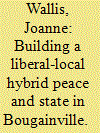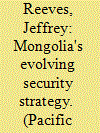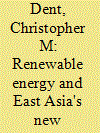| Srl | Item |
| 1 |
ID:
118576


|
|
|
|
|
| Publication |
2012.
|
| Summary/Abstract |
There has been an increasing attempt to theorise the emergence of a liberal-local hybrid approach to state-building, which recognises the coexistence and interaction of liberal and local socio-political institutions. There has not yet been a sustained attempt to understand what occurs when a liberal-local approach is adopted from the outset of a state-building operation. This article seeks to fill this gap by applying the literature to the state-building process in Bougainville, an autonomous region of Papua New Guinea.
|
|
|
|
|
|
|
|
|
|
|
|
|
|
|
|
| 2 |
ID:
118573


|
|
|
|
|
| Publication |
2012.
|
| Summary/Abstract |
This paper focuses on the relationship between national security and environmentalism in South Korea. The 2009 South Korean Presidential Committee on Green Growth set a long-term vision for South Korea to 'go green'. This is promoted as a new state-led development paradigm and a response to new global security risks. The paper identifies official and unofficial contested narratives on development, environmentalism and national security. By focusing on civil society movements, the paper identifies challenges to the exclusionary realist and liberal institutional approaches to South Korea's Green Growth initiative. These alternative discourses of national security are unpacking and reconstructing the relationship between development and environmentalism through the question of who defines 'national security' and for whose interests.
|
|
|
|
|
|
|
|
|
|
|
|
|
|
|
|
| 3 |
ID:
118575


|
|
|
|
|
| Publication |
2012.
|
| Summary/Abstract |
With the publication of its 2010 National Security Concept and its 2011 Foreign Policy Concept, Ulaanbaatar has formalised a shift in foreign policy that has been readily apparent since 2000. Whereas Mongolia's foreign policy for the 1990s was formulated around an omni-enmeshment strategy, its foreign policy from 2000 onward is best conceptualised as an amalgam of omni-enmeshment and balance of influence. Ulaanbaatar's new foreign policy strategy implicitly identifies China as the country's largest security concern. This sense of a China 'challenge' is mirrored in Ulaanbaatar's post-2000 foreign policy relations.
|
|
|
|
|
|
|
|
|
|
|
|
|
|
|
|
| 4 |
ID:
118577


|
|
|
|
|
| Publication |
2012.
|
| Summary/Abstract |
Private equity has had a short but eventful history in East Asia, characterized first by US firm dominance and then by a nationalistic backlash. This article charts these earlier patterns, but argues that significant developments have taken place since the early 2000s, which have strengthened the position of private equity capital in the Asian political economy. As private equity deal-making has returned to Asia, new linkages have been formed between US private equity funds and local private equity players. Of particular importance have been US-Asian joint ventures, Asian nationals returning to domestic firms from US private equity houses and supportive local elites in the banking and pension fund sectors. The significance is two-fold. First, the spread of private equity has been founded on interdependent relationships between US actors and local actors, which have more successfully grounded the private equity industry in national political economies than its origins in the Asian crisis period. Second, despite the relative localization of Asian private equity, industry practices are still largely shaped by the US model of private equity and the merger and acquisition activity that it entails, rather than a distinct Asian private equity model. The findings of the article contribute to calls that have been made for research on the changing global economy that comprehensively integrates domestic and international levels of analysis.
|
|
|
|
|
|
|
|
|
|
|
|
|
|
|
|
| 5 |
ID:
118574


|
|
|
|
|
| Publication |
2012.
|
| Summary/Abstract |
East Asia's renewable energy (RE) sector has grown faster than any other region's since the mid-2000s. It is argued that renewables formed an integral part of the region's new industrial policies and new developmentalism, which are founded on new configured forms of state capacity shaped in response to various challenges, primarily climate change, energy security, globalisation and global neo-liberalism. By studying the recent progress of East Asia's RE sector, we gain useful insights into these key developments in East Asia's political economy and the region's prospects for transition towards low carbon development. This analysis considers how and why different approaches to RE policy emerged in East Asia, to what extent the promotion and expansion of East Asia's RE sector is part of a new industrial policy paradigm and new developmentalism, and what the study of East Asian policies on promoting renewable energy can tell us about the region's broader approach to low carbon development. Although the promotion of renewable energy has been a fundamental part of East Asia's recent macro-development plans and new developmentalism generally, these same plans suggest that East Asian states will simultaneously continue to significantly promote high carbon and ecologically damaging industrial activities, thus undermining the low carbon credentials of East Asia's new developmentalism. The path to meaningful low carbon development will be very long and will take many decades to achieve. However, it is contended that by maintaining and improving their various forms of state capacity over time, the East Asian states will be well positioned to sustain the significant growth of their renewable energy sectors and thereby further strengthen the low carbon development orientation of their new industrial policies, macro-development plans and strategic economic thinking.
|
|
|
|
|
|
|
|
|
|
|
|
|
|
|
|